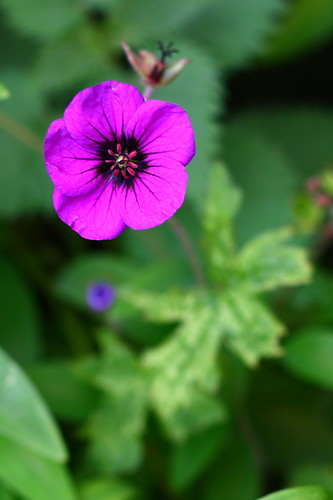 Today I pulled out one of my college texts, a Heath Anthology of American Literature. (One semester for some reason we strayed from the Norton, and here almost three thousand pages of proof.) I found a poem by Theodore Roethke, 1909-1963, a strangely troubled man from Michigan who grew up amongst his father’s commercial greenhouses and is described as a heavy drinker who drank to seek oblivion, a rudely aggressive tennis player, and an “inveterate casual pawer of women.” He wrote beautifully of birth and death in growing things, and curiously and eloquently of old women. He won a Pulitzer, a Fulbright and twice the Guggenheim. There is no accounting for who we are and where we come from to what we can produce. A lesson, perhaps.
Today I pulled out one of my college texts, a Heath Anthology of American Literature. (One semester for some reason we strayed from the Norton, and here almost three thousand pages of proof.) I found a poem by Theodore Roethke, 1909-1963, a strangely troubled man from Michigan who grew up amongst his father’s commercial greenhouses and is described as a heavy drinker who drank to seek oblivion, a rudely aggressive tennis player, and an “inveterate casual pawer of women.” He wrote beautifully of birth and death in growing things, and curiously and eloquently of old women. He won a Pulitzer, a Fulbright and twice the Guggenheim. There is no accounting for who we are and where we come from to what we can produce. A lesson, perhaps.
from Meditations of an Old Woman
Elegy
1958
Her face like a rain-beaten stone on the day she rolled off
With the dark hearse, and enough flowers for an alderman,
And so she was, in her way. Aunt Tilly.
Sighs, sighs, who says they have sequence?
Between the spirit and the flesh, — what war?
She never knew;
For she asked no quarter, and gave none,
Who sat with the dead when the relatives left,
Who fed and tended the infirm, the mad, the epileptic,
And, with a harsh rasp of a laugh at herself,
Faced up to the worst.
I recall how she harried the children away all the late summer
From the one beautiful thing in her yard, the peachtree;
How she kept the wizened, the fallen, the misshapen for herself,
And picked and pickled the best, to be left on rickety doorsteps.
And yet she died in agony,
Her tongue, at the last, thick, black as an ox’s.
Terror of cops, bill collectors, betrayers of the poor, —
I see you in some celestial supermarket,
Moving serenely among the leeks and cabbages,
Probing the squash,
Bearing down, with two steady eyes,
On the quaking butcher.
I wonder if everyone knows an Aunt Tilly; tart-tongued and not suffering fools, putting up with no nonsense, and getting things done. The Aunt Tilly’s and Miss Pross’ (from A Tale of Two Cities of the world …rock.
Poetry Friday is at Picture Book of the Day, Anastasia Suen’s blog.
Thanks for this, T. I’d never seen it, being more familiar with his greenhouse poems. What beautifully strange images. Tilly’s got me quaking . . .
Love this poem. Thanks for sharing.
“Between the spirit and the flesh, — what war?”
That line really gets to me. It’s Eliot-like, in a way.
"There is no accounting for who we are and where we come from to what we can produce."
You said it. Love this poem. And I agree with Sarah that the line about the spirit & the flesh tastes of Eliot.
The description of Mr. Roethke makes me wonder how we’d get along if he were my neighbor. I’d probably think he was a strangely troubled man, as you said, and he’d think I was a strange little girl who always avoided him.
What an amazing post! Thank you so much.
And I’m so sorry we don’t seem to be able to email! How bizarre. And I’m so sorry to hear your “no.” But I understand completely. Very best in your work and deadlines!
Sighs, sighs, who says they have sequence?
Mercy that’s pretty.
Inveterate pawing aside.
She gave away her best peaches, “And yet she died in agony.”
I was going to write, “Life just isn’t fair,” but I guess the bigger thought is that no matter how fair we try to make life, death will have its own way, fair or not.
Hmm…going off to thing more deep thoughts…
I was going to say this poem was unflattering to poor Aunt Tilly, but honestly, I think she would have loved it. She seems to be able to take the rough stuff head on. Not me. I’d be jumping behind a door whenever I saw her or Mr. Roethe coming.
I found this poem very moving.
He looks at Aunt Tilly and sees her plain.
I always liked Brenda Uland of “If you want to write” fame who knew Roethe.
“And, with a harsh rasp of a laugh at herself,/Faced up to the worst.”
Does it get any better than that line?